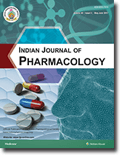
INDIAN JOURNAL OF PHARMACOLOGY
Scope & Guideline
Transforming clinical practices with groundbreaking pharmacological research.
Introduction
Aims and Scopes
- Clinical Pharmacology and Therapeutics:
Research on the effects of drugs in humans, focusing on their efficacy, safety, and optimal use in clinical settings. This includes studies on drug interactions, adverse effects, and therapeutic outcomes. - Pharmacovigilance and Drug Safety:
Studies that monitor and evaluate the safety of medications post-marketing, including adverse drug reactions and their management. The journal emphasizes the importance of reporting and analyzing drug-related adverse events. - Natural Products and Traditional Medicine:
Research investigating the pharmacological properties of natural compounds, including herbal medicines and their efficacy in treating various diseases. This area highlights the relevance of traditional medicine in modern pharmacological practices. - Innovations in Drug Development:
Papers focusing on new drug formulations, delivery systems, and therapeutic strategies, including the use of nanotechnology and computational methods in drug discovery. - Experimental and Preclinical Studies:
Research utilizing animal models to understand drug mechanisms, efficacy, and safety before clinical trials. This includes studies on pharmacokinetics and pharmacodynamics. - Public Health and Epidemiology:
Research addressing the impact of pharmacological interventions on public health, including studies on drug accessibility, prescribing patterns, and the role of pharmacology in managing infectious diseases.
Trending and Emerging
- Impact of COVID-19 on Pharmacology:
A significant number of recent articles address the pharmacological implications of COVID-19, including drug repurposing, vaccine development, and management of post-COVID complications, underscoring the pandemic's influence on research priorities. - Artificial Intelligence and Machine Learning in Drug Development:
There is a growing interest in the application of AI and machine learning in pharmacological research, particularly in experimental design and data analysis, showcasing a trend towards integrating technology in drug discovery. - Neuropharmacology and Mental Health:
An increasing number of studies focus on neuropharmacological agents and their effects on mental health disorders, reflecting a broader understanding of the importance of mental health in pharmacological research. - Natural Products and Phytotherapy:
Research on natural products is gaining momentum, with a focus on their pharmacological potential and mechanisms of action, indicating a resurgence in interest in herbal medicine and its therapeutic applications. - Pharmacovigilance and Safety Monitoring:
There is an upward trend in research dedicated to pharmacovigilance, emphasizing the need for ongoing safety monitoring of medications and the importance of understanding adverse drug reactions in clinical practice.
Declining or Waning
- Traditional and Alternative Medicine:
Although still relevant, there has been a noticeable decline in the number of papers focusing solely on traditional and alternative medicinal practices. This could indicate a shift towards more evidence-based approaches in pharmacology. - Basic Pharmacological Mechanisms:
Research solely dedicated to fundamental pharmacological mechanisms appears to be waning, as the focus moves towards clinical applications and translational research. - Pharmacogenetics and Personalized Medicine:
While once a hot topic, there seems to be a decrease in publications centered on pharmacogenetics, possibly due to a greater emphasis on broader clinical applications rather than genetic factors influencing drug responses. - Drug Regulation and Policy:
There has been less emphasis on studies related to drug regulation and policy in recent publications, suggesting a potential gap in exploring the implications of pharmacological practices on healthcare systems.
Similar Journals

NAUNYN-SCHMIEDEBERGS ARCHIVES OF PHARMACOLOGY
Championing Excellence in Pharmacological ResearchNAUNYN-SCHMIEDEBERGS ARCHIVES OF PHARMACOLOGY is a prestigious journal published by SPRINGER, focusing on the dynamic fields of pharmacology and toxicology. With an ISSN of 0028-1298 and an E-ISSN of 1432-1912, this esteemed publication has been a staple in the scientific community since its inception in 1969, continuing to wield influence with a convergence of research that reaches through 2024. Ranked in the Q2 category for both medicine and pharmacology, it stands at an impressive 111th out of 313 in the Scopus rankings for pharmacology, reflecting its significant impact in the field. Though not offering open access, the journal remains a vital resource for researchers, professionals, and students seeking to explore groundbreaking studies and advancements in pharmacological science. With its high standards and comprehensive coverage, NAUNYN-SCHMIEDEBERGS ARCHIVES OF PHARMACOLOGY is essential reading for those dedicated to understanding the mechanisms of drug action and the complexities of therapeutic interventions.

DARU-Journal of Pharmaceutical Sciences
Championing significant contributions to global health advancements.DARU-Journal of Pharmaceutical Sciences is a leading peer-reviewed journal published by SPRINGER INT PUBL AG that focuses on the dynamic and rapidly evolving fields of pharmaceutical sciences, including drug discovery, pharmacology, and toxicology. With an impressive Q2 ranking in both Drug Discovery and Miscellaneous Medicine categories for 2023, this journal stands out as a vital resource for researchers, professionals, and students alike, offering a platform for significant contributions to the scientific community. Covering a comprehensive scope from 2000 to 2024 and indexed by Scopus, the journal ranks within the top percentile in its field, with a ranking of #66/313 in Pharmacology and #34/157 in Drug Discovery, reaffirming its impact and relevance. The journal promotes open access to foster widespread dissemination of knowledge in pharmaceutical sciences, ultimately aiming to bridge the gap between research and clinical applications. For those looking to stay at the forefront of pharmaceutical innovation, DARU represents an invaluable connection to the latest studies and breakthrough findings.

Frontiers in Pharmacology
Empowering researchers with cutting-edge insights in pharmacology.Frontiers in Pharmacology, published by FRONTIERS MEDIA SA, stands as a leading open-access journal dedicated to advancing the field of pharmacology since its inception in 2010. With its ISSN 1663-9812, the journal is based in Switzerland and maintains a vital role in disseminating innovative research findings that span various disciplines within pharmacology, including pharmacokinetics, toxicology, and pharmacogenetics. In 2023, Frontiers in Pharmacology has achieved an impressive standing within the scientific community, being ranked in the Q1 category for both general and medical pharmacology, highlighting its critical contribution to the field with a Scopus ranking of #41 out of 272 in medical pharmacology and #76 out of 313 in pharmacology, toxicology, and pharmaceutics, placing it in the 75th and 85th percentiles, respectively. Researchers and practitioners benefit from its open-access model, which ensures widespread accessibility to groundbreaking research, fostering collaboration and innovation across the pharmaceutical sciences. With its commitment to excellence, Frontiers in Pharmacology serves as an essential resource for those looking to explore and contribute to the latest advancements in pharmacological research.

European Journal of Pharmacology
Exploring the frontiers of therapeutic applications and drug development.The European Journal of Pharmacology, a prestigious publication by Elsevier, serves as a vital resource in the field of pharmacology, offering rich insights into drug development and therapeutic applications. Since its inception in 1967, this journal has evolved to encompass groundbreaking research, including pharmacokinetics, toxicology, and innovative pharmacological methodologies, making it an essential platform for researchers and professionals alike. With an impressive impact factor that places it in the Q1 category of pharmacological journals and a Scopus ranking of #49 out of 313, the journal is recognized in the 84th percentile within its category, solidifying its significance in the academic community. Although the journal is not open access, it continues to attract contributions from leading scientists worldwide, ensuring that cutting-edge findings are disseminated effectively. The European Journal of Pharmacology not only highlights advancements in drug discovery and clinical applications but also promotes interdisciplinary collaboration, ultimately contributing to the progress of healthcare globally.

JOURNAL OF PHARMACY AND PHARMACOLOGY
Advancing pharmaceutical knowledge for a healthier tomorrow.Journal of Pharmacy and Pharmacology, published by Oxford University Press, is a prestigious academic journal dedicated to the advancement of knowledge in the fields of pharmaceutical sciences and pharmacology. With a strong heritage dating back to 1949, this journal maintains a robust influence, as evidenced by its ranking in the second quartile (Q2) across both Pharmaceutical Science and Pharmacology categories for 2023. The journal is accessible without an open access option, ensuring traditional academic engagement and providing valuable insights for researchers and professionals. It boasts an impressive Scopus ranking, with a percentile positioning of 72nd in Pharmaceutical Science and 67th in Pharmacology. Aimed at fostering innovative research and facilitating the exchange of cutting-edge scientific knowledge, the Journal of Pharmacy and Pharmacology serves as an essential resource for scientists, students, and healthcare professionals committed to enhancing therapeutic outcomes and advancing pharmaceutical innovations.
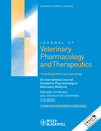
JOURNAL OF VETERINARY PHARMACOLOGY AND THERAPEUTICS
Connecting Research and Practice for Optimal Animal Well-BeingJOURNAL OF VETERINARY PHARMACOLOGY AND THERAPEUTICS is a crucial publication in the field of veterinary medicine, dedicated to advancing knowledge and practices related to pharmacology and therapeutic interventions in animals. Published by WILEY, this peer-reviewed journal has been a reliable source of innovative research since its inception in 1978, and it continues to play an integral role in shaping veterinary pharmacology through its commitment to high-quality scientific discourse. With an impact factor reflective of its robust academic standing, the journal is categorized in the Q3 quartile for Pharmacology and Q2 for Veterinary (miscellaneous) as of 2023, highlighting its relevance and significance within these domains. It is indexed in Scopus with commendable rankings, particularly in General Veterinary, where it ranks #45 out of 194, placing it in the 77th percentile. This journal not only offers a platform for original research articles but also caters to the dissemination of practical applications and reviews that are essential for veterinarians, researchers, and students alike in enhancing animal health and welfare. Although not an open-access publication, its contributions remain accessible to those engaged in the veterinary sciences through institutional subscriptions. The journal's enduring legacy and forward-looking approach make it a vital resource for anyone interested in veterinary therapeutics and pharmacology.

TROPICAL JOURNAL OF PHARMACEUTICAL RESEARCH
Fostering breakthroughs in drug development and application.Tropical Journal of Pharmaceutical Research is an esteemed open-access platform dedicated to advancing the field of pharmaceutical sciences, published by the Pharmacotherapy Group in Nigeria. With an ISSN of 1596-5996 and open access established since 2002, this journal serves as a critical resource for researchers, professionals, and students seeking to disseminate and access high-quality research in both pharmaceutical science and pharmacology. Despite its ranking in the third quartile (Q3) for Pharmaceutical Science and the fourth quartile (Q4) in Pharmacology as of 2023, the journal continues to stand out with its commitment to fostering significant dialogue and innovation in the scientific community. Anchored at the University of Benin, Faculty of Pharmacy, the journal invites contributions that explore novel pharmaceutical research, clinical applications, and drug development, playing a vital role in addressing health challenges that are particularly relevant to tropical regions. Researchers can look forward to publishing their findings in a journal that not only promotes the sharing of knowledge but also enhances the scientific discourse within a rapidly evolving field.
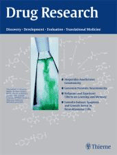
Drug Research
Empowering Researchers in the Quest for InnovationDrug Research, published by GEORG THIEME VERLAG KG, is a pivotal journal housed in the vibrant realm of pharmacology and drug discovery. With a commitment to advancing the understanding of medicinal substances, this journal serves as an essential resource for researchers, professionals, and students dedicated to the field. The journal boasts an ISSN of 2194-9379 and an E-ISSN of 2194-9387, reflecting its dual commitment to print and digital accessibility. Despite its status as a Q3 journal in both Drug Discovery and Miscellaneous Medicine categories as of 2023, it continues to offer valuable insights with a focus on the latest innovations, methodologies, and findings in drug research. Based in Germany, Drug Research promotes scholarly communication and collaboration within the scientific community, ensuring that its contributions remain impactful in shaping future therapeutic discoveries. The journal is indexed in relevant databases, enhancing its visibility and reach, thus fostering a robust academic dialogue.
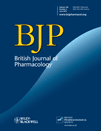
BRITISH JOURNAL OF PHARMACOLOGY
Exploring the frontiers of pharmacology and toxicology.British Journal of Pharmacology is a premier, peer-reviewed journal published by Wiley, specializing in the dynamic field of pharmacology. With a robust impact factor, this journal ranks in the top quartile (Q1) for pharmacology according to the 2023 category rankings, emphasizing its significance and reputation among the global scientific community. As an essential resource for researchers, professionals, and students alike, the journal provides a platform for innovative research spanning foundational studies to clinical applications in pharmacology, toxicology, and pharmaceutics. Since its inception in 1966, the journal has consistently contributed to the advancement of pharmacological science, fostering a deeper understanding of drug action mechanisms and therapeutic advancements. Although primarily subscription-based, the British Journal of Pharmacology is committed to disseminating high-quality research that shapes the future of the field.
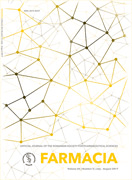
FARMACIA
Exploring the Frontiers of Pharmacology and Toxicology.FARMACIA is a renowned academic journal published by the SOC STIINTE FARMACEUTICE ROMANIA, specializing in the field of pharmacology, toxicology, and pharmaceutics. With a rich history dating back to its initial publication years of 1945 to 1946, and ongoing contributions since 2008, the journal has established itself as a significant platform for disseminating cutting-edge research in the pharmaceutical sciences. Indexed in Scopus, it holds a commendable Q2 ranking in the Pharmacology, Toxicology and Pharmaceutics category, reflecting its importance in the field. The journal aims to foster knowledge sharing and innovation among researchers, professionals, and students alike, making it an essential resource for advancing pharmaceutical research. Although it does not currently offer Open Access, the content is accessible to a broad academic audience, ensuring valuable insights into current trends and discoveries in pharmacotherapy and drug development. For those seeking a deeper understanding of the evolving landscape of pharmaceutical sciences, FARMACIA provides a critical lens through which to explore and engage with the latest scientific advancements.